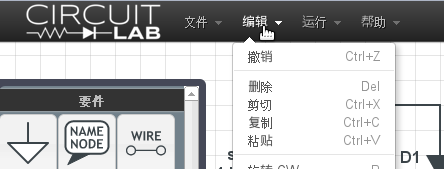We've recently released a set of updates to our front-end GUI code that will make CircuitLab better suited for larger schematics. In addition to expanding the grid size (it's now infinite!), we have also made several changes that should make panning and zooming around your circuits much faster. Give it try in the editor, and if you find any issues let us know!
CircuitLab 现已推出简体中文与繁体中文版! CircuitLab 提供在线、浏览器内置工具进行原理图捕获和电路模拟。这些工具使学生、业余爱好者和专业工程师在建立原型之前能够设计分析模拟和数字电路系统。在线原理图捕获功能让业余爱好者可轻松分享和讨论他们的设计,同时在线电路模拟允许您快速进行设计迭代,并加速学习电子学知识。

CircuitLab 簡體中文與繁體中文版上線啦! CircuitLab 提供在綫的瀏覽器內工具用於原理圖捕獲和電路模擬。這些工具使學生、愛好者和專業工程師在創建一個原型之前,可以設計並分析類比和數位系統。綫上原理圖捕獲使愛好者輕而易舉地分享並探討他們的設計,同時,綫上電路模擬還可快速重複設計並促進對電子學的了解。

CircuitLab is now available in simplified and traditional Chinese! CircuitLab provides online, in-browser tools for schematic capture and circuit simulation. These tools allow students, hobbyists, and professional engineers to design and analyze analog and digital systems before ever building a prototype. Online schematic capture lets hobbyists easily share and discuss their designs, while online circuit simulation allows for quick design iteration and accelerated learning about electronics.
Our users have always been quick to test (and exceed!) the limits of the CircuitLab circuit simulation code, and while over the past few months we've quietly delivered small improvements such as revised MOSFET/BJT/JFET models, today we're happy to release our first major overhaul of our simulation engine. Since CircuitLab is a web-based application, no explicit update is necessary -- just launch the editor and you're automatically running the latest version!
A brief list of some issues we've addressed in this update:
If you've had simulation issues in the past, give your circuits another try and see how they do -- and please let us know on our forums.
While of course we'd prefer to release smaller updates more frequently, these changes required major surgery to our simulation engine. As usual, our entire mixed-mode simulation engine runs in client-side Javascript, providing a zero-install consistent circuit simulation experience to our academic, hobbyist, and professional engineering users across Windows, Mac OS X, Linux, and now iPad devices. With over a thousand people using the CircuitLab editor every day, and more than 21,000 unique saved circuits, we wanted to be sure everything was up to spec. Our team continues working to improve the capabilities and performance of our simulator. Thanks for your patience, and please give it a spin!
CircuitLab is an in-browser schematic capture and circuit simulation software tool to help you rapidly design and analyze analog and digital electronics systems.